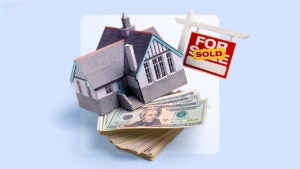Buying a house with cash vs. a mortgage




Key takeaways
- Paying for a house in cash can speed up the buying process, lower your long-term costs and give you instant 100 percent home equity.
- Getting a mortgage, on the other hand, allows you to save that cash for other financial goals, offers tax deductions and can enhance your credit score.
- Before you buy a home in cash, consider factors like the state of the local real estate market and the long-term cost of a mortgage.
If you’re thinking about making a cash offer on a house, you’re not alone. All-cash deals made up 32 percent of home purchases as of February 2025, according to the National Association of Realtors (NAR). However, even if you have the means to pay for a home in full, it doesn’t necessarily mean you should. Here are all the pros and cons to buying a house in cash vs. getting a mortgage.
Buying a house in cash vs. a mortgage
|
Buying a house in cash |
Buying a house with a mortgage |
|
|
Source of funds |
Money you already have | Money borrowed from a lender |
|
Requirements |
Paying all-cash requires a sizable amount of liquid assets available to cover the purchase price and other costs. |
Lenders require good credit and a low debt-to-income ratio (DTI). You’ll also need enough cash for a down payment and closing costs. |
|
Costs |
No lender-related closing costs or monthly principal and interest payments. |
Monthly mortgage payments and additional closing costs. |
|
Impact on credit |
Does not improve your credit. |
Could boost credit health with timely loan payments. |
What is an all cash offer?
With an all-cash offer, the buyer is offering to pay for the home in full, upfront, instead of financing the purchase by taking out a mortgage. The buyer might tap their savings, investments, funds from the sale of another property or another source, such as gift money from family members.
You’ll still need to provide financial documentation, since the seller will want proof of funds — in fact, you may need to provide even more, or more detailed, statements than a lender might ask for. And you’ll still have to pay certain closing costs, like legal fees, the cost of a title search and title insurance and other administrative expenses. But you’ll get to skip the usual lender-related closing costs.
Advantages of using cash to buy a home
- Beat out other buyers
- Speed up the homebuying process
- Save on closing costs
- Lower your long-term costs
Beat out other buyers
A shortage of housing inventory has fueled a very competitive market. In fact, according to NAR, every home for sale in February 2025 received an average of 2.3 offers — and an all-cash offer stands out from the crowd. Put yourself in the seller’s shoes: If you’re comparing two bids that hinge on the ability to get full lender approval with a third offer that requires nothing and is ready to go, which would appeal to you more?
Speed up the homebuying process
Paying with cash can also simplify the home-purchase process. There’s no loan application, preapproval or approval, so you’ll save yourself the potential stress of shopping for and dealing with a lender. You can likely save a good chunk of time, too, since a lender won’t need to gather and comb through all your paperwork. Underwriting — the process by which a lender evaluates your finances and decides whether to approve your mortgage application — typically adds an additional 30 to 45 days to the home-purchase experience.
Save on closing costs
If you have the funds, paying all-cash for a home definitely saves you money, since you won’t have to pay any of the costs associated with taking out a mortgage. The origination fee and other closing costs can add up to 2 to 5 percent of the purchase price. So, if you’re purchasing a $300,000 home, eliminating closing costs might help you lower your bill by somewhere between $6,000 and $15,000.
Lower your long-term costs
Along with saving on upfront fees, paying in cash means you won’t be charged interest, which adds up to huge savings. For example, let’s say you’re comparing a $425,000 cash offer with a $340,000 30-year mortgage (a loan on the same home after 20 percent down) with a 6.5 percent interest rate. Over the course of that loan, Bankrate’s mortgage calculator shows you would pay nearly $433,651 in interest, for a total cost of $773,651.
Advantages of getting a mortgage to finance a home
- Use your money elsewhere
- Reduce your tax bill
- Build your credit
Use your money elsewhere
Before you think about writing a check for the entire cost of a new home, think about what else you might do with that cash. Do you need to cover college tuition for your kids? Are you behind on your retirement savings? Might investing in the stock market or some other investment yield a higher return? Take a long look at your finances to understand how much liquid assets you’ll have remaining if you buy a house in cash vs. getting a mortgage. If the amount of cash needed to purchase a house seems like a potential issue, mortgage is likely a better option. You can still make a sizable down payment and keep most of those funds free for other uses.
Reduce your tax bill
Getting a mortgage can reduce what you owe in taxes, since mortgage interest payments are tax-deductible. This can be very important for high earners who typically itemize and want to maximize their deductions.
Build your credit
Having debt isn’t necessarily a bad thing. Having a mortgage gives you the chance to make the kind of regular on-time payments that look great in the eyes of the major credit-reporting agencies. In the long run, managing your mortgage debt well over time can help improve your credit score.
Other homebuying considerations
As you ponder buying a house with cash or a mortgage, ask yourself these questions to help guide your thinking:
What’s the state of the housing market?
If you really want to secure a particular home, another buyer might feel the same way. If that’s the case, an all-cash offer can make a big difference. Remember that real estate is a hyper-local industry, though. If you’re buying in a very hot housing market, all-cash can be an ideal route. If you’re buying in an area where sales have been more sluggish, you may be just as successful with a simple mortgage preapproval.
How much more will you pay with a mortgage?
Closing costs and accrued interest can make a mortgage much more expensive over the long term. Here’s a breakdown of how much you might pay on a $400,000 home purchase, assuming a 30-year fixed-rate loan at 7 percent:
- Down payment: $80,000 (20 percent)
- Loan amount: $320,000
- Closing costs: $6,400 to $16,000 (2 to 5 percent)
- Total interest paid over 30 years: $446,430
- Total loan cost over 30 years: about $766,000
How much money will you have left if you pay in cash?
If you pay cash for a home, you might feel good knowing you won’t have a big bill each month, but make sure you don’t stretch your finances too thin to accomplish that. You’ll still need to have an emergency fund in place, and you’ll need to have enough money to cover things like home maintenance and repairs, property taxes, homowners insurance and utilities. You’ll also want to make sure your cash purchase doesn’t impact saving for retirement or other long-term financial goals.
Cash offers vs. mortgages: What’s right for you?
Ultimately, deciding between a cash offer and a mortgage depends on your financial situation, the current market and your personal preferences. Here’s when you should consider financing a home with a mortgage:
- You want to use the funds for other financial goals or invest them elsewhere.
- You want to capitalize on tax benefits and build your credit over time.
- Mortgage interest rates are low.
On the other hand, buying a house in cash might be a better option in these situations:
- You have the means to pay cash without negatively impacting your financial health.
- You aren’t saving money for any future financial goals.
- You want to buy an investment property in need of substantial repairs but can’t get approved for financing.
“From a purely financial perspective, the savvy move is to carry a mortgage balance and invest the proceeds in the stock market,” says Jeff Ostrowski, writer and housing market analyst at Bankrate. “That certainly works well if you locked in a 3 percent mortgage rate. However, today’s higher rates complicate the borrowing decision. And for many homeowners, paying cash provides valuable peace of mind.”
FAQs
Why we ask for feedback Your feedback helps us improve our content and services. It takes less than a minute to complete.
Your responses are anonymous and will only be used for improving our website.




